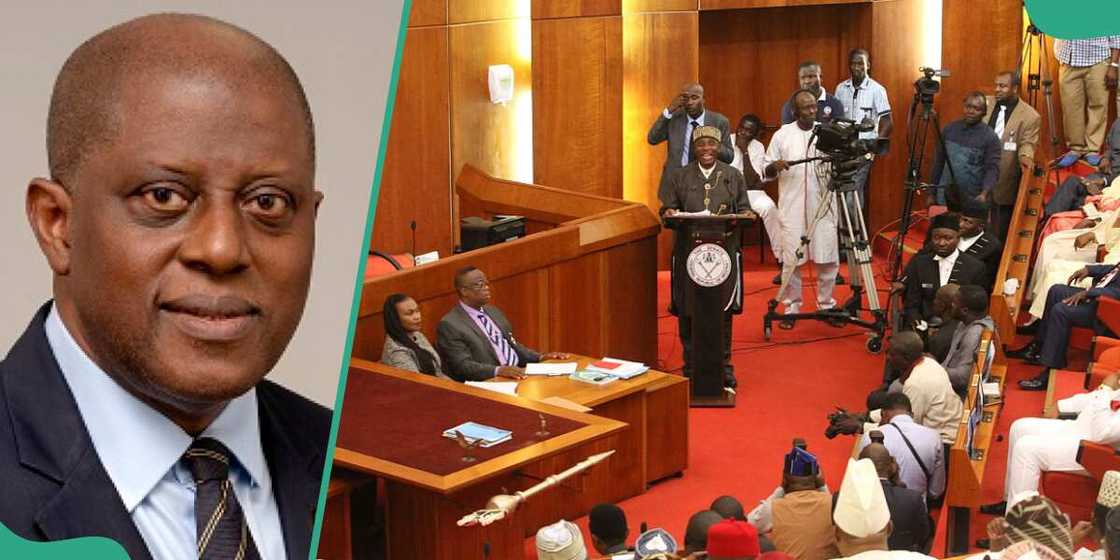Access, Zenith, UBA, Others to Have N1 Trillion Capital Base as Senate Moves to Amend Laws
- The Nigerian Senate is proposing a law to raise the capital base of commercial banks to about N1 trillion
- Currently, the law puts banks’ recapitalisation at N100 billion, which lawmakers said has been eroded by the naira’s devaluation
- The bill also seeks to amend the tenure of the CBN governor and deputies to a single non-renewable term of six years
PAY ATTENTION: The 2024 Business Leaders Awards Present Entrepreneurs that Change Nigeria for the Better. Check out their Stories!
Legit.ng’s Pascal Oparada has reported Tech, Energy, Stocks, Investment and the Economy for over a decade.
On Tuesday, February 27, 2024, the Nigerian Senate passed a bill for a second reading seeking changes to the Central Bank of Nigeria (CBN) Act, including a proposal to raise banks’ authorised capital to N1 trillion.
The current CBN Act, in section 4(1), puts the authorised capital at N100 billion, which the senators said had been eroded by the crash of the naira.

Read also
Dollar crashes against naira on Binance as CBN orders BDCs to sell USD to Nigerians at cheap rate

Source: Getty Images
New bill seeks to limit CBN governor's tenure
The lawmakers also sought to amend Section 8(2) of the CBN’s law to provide a single, non-renewable term for CBN governors and their deputies.
PAY ATTENTION: Share your outstanding story with our editors! Please reach us through info@corp.legit.ng!
The proposed bill will compel the Nigerian government to repay loans it received from the CBN under Ways and Means advances within three months from the date of issuance.
The bill’s sponsor, Senator Abiru, said if passed into law, it will strengthen the apex bank to carry out its primary functions in line with section 2 of the bank’s Act, which is to ensure monetary and price stability, issue currencies in Nigeria, maintain external reserves to guard the international value of the naira and promote sound financial system in Nigeria.
According to Daily Trust, the bill proposes the bank recapitalisation to provide the paid-up capital to be about N1 trillion and may be increased over time.
New law to mandate FG to repay loans fast
The current CBN Act grants the governor and deputies a tenure of five years, and they are eligible for re-appointment for another term not exceeding five years.
Also, the current Act enables the CBN to grant temporary advances to the Nigerian government to finance shortfalls in budget revenue.
The advance is not to exceed five per cent of the year’s actual government revenue and must be repaid at the end of the financial year in which it was given.
A previous report by Legit.ng showed that Nigeria was indebted to the CBN to the tune of about N18 trillion via the Ways and Means advances.
The federal government, in 2023, securitised the CBN advances, adding it to the country’s domestic stock, which led to Nigeria owing about N87 trillion as a total debt profile as of December 2023.
Data from the Debt Management Office (DMO) shows that the Nigerian government’s external debt hit $41.59 billion as of December 2023, while domestic debt is about N55.93 trillion.
Nigeria’s debt to hit a new record
Legit.ng previously reported that the official data on Nigeria's public debt profile revealed a notable surge, surpassing an eightfold increase in the last ten years.
This substantial growth became even more evident when considering the inclusion of the central bank loan recently authorised for securitisation by President Bola Tinubu.
PAY ATTENTION: Donate to Legit Charity on Patreon. Your support matters!
Source: Legit.ng



